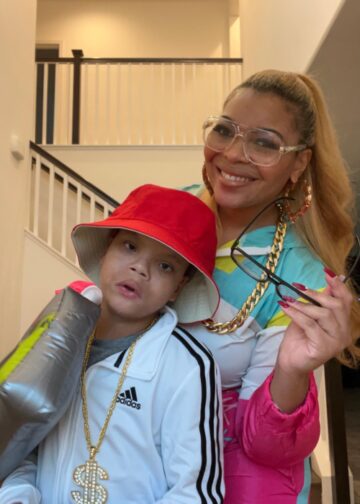#NNPA BlackPress
Meet Genesis A. Emery-Foley: Millennial ‘Boss Mom’
For Mother’s Day weekend, the Chicago Defender shares stories of dynamic Black women thriving in their careers and providing loving guidance for their families. Today’s millennial woman is layered. She has the brilliance to close multi-million dollar deals, the heart to raise amazing children and the authenticity to lead as a purpose partner with […]
The post Meet Genesis A. Emery-Foley: Millennial ‘Boss Mom’ first appeared on BlackPressUSA.


For Mother’s Day weekend, the Chicago Defender shares stories of dynamic Black women thriving in their careers and providing loving guidance for their families.
Today’s millennial woman is layered. She has the brilliance to close multi-million dollar deals, the heart to raise amazing children and the authenticity to lead as a purpose partner with her mate. To quote Queen Bey, “…strong enough to bear the children, then get back to business.”
This woman thrives on persevering through her day with power, skill and the ability while making non-negotiable time for self-care. This woman is a millennial powerhouse and boss mom, Genesis A. Emery-Foley. As an award-winning Chief Marketing Officer, published author, entrepreneur, national speaker and celebrated global philanthropist, Emery-Foley is the founder of The BluePrint Haus Agency, an integrated digital marketing firm led by the industry’s most innovative brand engineers and results-driven accelerators.
For Mother’s Day, the Chicago Defender interviewed Emery-Foley, who talked about the meaning of success, being an impactful entrepreneur and important lessons on motherhood.
Chicago Defender: With over 15 years of experience in entrepreneurship, digital marketing, brand communications, and public relations, how do you cultivate and nurture stakeholder relationships?
Emery-Foley: Relationship building is at the core of what I do. I cultivate relationships through networking, referrals and expressing a genuine passion to build, bond and maintain relationships both personally and professionally.
In terms of stakeholder relationships and engagement, I focus on how my talents and expertise can best support the needs of my professional allies, create proven solutions to best solve their pain and make an impact in ways that will galvanize their efforts and foster the highest level of success.
Motherhood has required me to learn the importance of grace and that it’s perfectly okay to be imperfect. – Genesis A. Emery-Foley
Chicago Defender: Your work has been published across national media platforms such as ABC, FOX, NBC, CBS and more. As a trusted accelerator among startups, what advice would you give to the entrepreneur struggling to gain national attention and brand recognition?
Emery-Foley: My #1 rule of thumb is to lead with your “why” and convey the value that your company brings to your target audience and key stakeholders. If you start a company with the sole intention of owning a company and driving revenue, you’ll miss the most important factor — adding value to the audience you serve and driving meaningful impact in ways that will evoke global change.
My philosophy is that an entrepreneur’s duty is to identify solutions that will help galvanize meaningful change and make the world a better place for humanity. My second piece of advice is to understand your target market, conduct research to fully understand what your customers want, innovate a product or service that will solve challenges and address common pain points, and create strategies that will disrupt the industry and distinctively set your company apart in the marketplace.
Remember, without having a clear understanding of why you entered into your respective industry and decided to become an entrepreneur, you’ll more than likely always struggle to create brand loyalty, drive consistent revenue and profitability and enable your company to scale. And without being a solutions-driven entrepreneur, you’ll miss the opportunity to connect with your customers, nurture and maintain relationships and build credibility.
It’s also imperative to consider the importance of brand building, key messaging and consistency. It’s crucial to develop a strong and consistent brand message that resonates with your audience, evokes emotion and aligns with their needs.
Taking this approach will position your brand as a leader in your industry, establish trust and credibility and build a community of loyal evangelists. Building a strong brand and gaining national recognition takes a ton of time and effort, but with dedication and a strategic approach, you can achieve your goals and garner national or perhaps even global attention.

Chicago Defender: Switching lanes, as we approach Mother’s Day it is important to shine light on women that lead personally and professionally. What is the most important lesson motherhood has taught you thus far?
Emery-Foley: One of the most important lessons that motherhood has taught me are the values of selflessness and grace. Being a mother and full-time caregiver to a child with special needs requires me to put the needs of my son before my own and furthermore, sacrifice personal time and energy to ensure that his well-being, happiness and childhood are met, first and foremost.
From having the experience of being a mother for the past eight years and raising a child diagnosed with Autism Spectrum Disorder, Rubinstein-Taybi Syndrome and ADHD, I’ve experienced so many challenges and moments where I’ve felt like I’ve failed and at times questioned if I was the best person for this assignment. However, my spiritual faith and relationship with God is a constant reminder that I was given a very special and life-changing assignment that has not only positively impacted my son’s life but also my own. As it has given me a greater sense of purpose and inspired others along the way. Motherhood has required me to learn the importance of grace and that it’s perfectly okay to be imperfect.
Motherhood has also allowed me to glean the importance of patience and flexibility. This role has required a great deal of adaptability, research and understanding as children’s needs and behaviors can change rapidly, and when parenting a child with special needs, there’s always new changes, behaviors, patterns and learning opportunities that we must embrace and quickly adapt to.
Over the years I’ve grappled with unexpected challenges. I’ve encountered my fair share of hospitalizations and emergency room visits where my son, Noah, would be connected to monitors and IV’s, and all the while I would cuddle next to him, read him books, join him in playing with his favorite toys and stuffed animals, and remind him of how much I love him and that he’ll be going home in no time.
Behind the scenes I might break down and cry and feel like a hopeless mom watching my son endure so much as an innocent child who never asked for any of this. However, the moment that I became his mother, I knew that I wanted nothing more in this world but to make him happy, watch him enjoy all the precious moments of his childhood and stand with him every step of the way as he continues to grow.
These desires have taught me the definition of unconditional love and what it truly means to dedicate your life to ensure that someone you care about feels abundance, purpose and happiness in their own life. This, for me, is motherhood. And I’m grateful to be chosen for the journey.

Chicago Defender: Being a millennial boss is no easy task. How has your definition of success shifted 15 years in the game?
Emery-Foley: Over the past 15 years, the definition of success has even shifted for me. While financial success and career achievements may have been the primary markers of success in the past, many people today including myself are placing a greater emphasis on work-life balance, personal fulfillment and social impact. Prioritizing self-care and emotional health can be just as important as career success, and in fact, may contribute to greater overall happiness and fulfillment.
For me, I enjoy spending time with my family, I enjoy being a devoted wife and mother, I enjoy constantly growing in my relationship with God and being a vessel of his promises by sharing my testimonies and experiences with others.
And lastly I enjoy finding satisfaction and personal achievement in my hard work. What success today looks like for me is peace, joy, evolution and professional talent that will create a meaningful impact for the rest of the world.
The post Meet Genesis A. Emery-Foley: Millennial ‘Boss Mom’ appeared first on Chicago Defender.
The post Meet Genesis A. Emery-Foley: Millennial ‘Boss Mom’ first appeared on BlackPressUSA.
#NNPA BlackPress
Beloved Actor and Activist Louis Cameron Gossett Jr. Dies at 87
NNPA NEWSWIRE — Louis Gossett Jr., the groundbreaking actor whose career spanned over five decades and who became the first Black actor to win an Academy Award as Best Supporting Actor for his memorable role in “An Officer and a Gentleman,” has died. Gossett, who was born on May 27, 1936, in Brooklyn, N.Y., was 87. Recognized early on for his resilience and nearly unmatched determination, Gossett arrived in Los Angeles in 1967 after a stint on Broadway.
The post Beloved Actor and Activist Louis Cameron Gossett Jr. Dies at 87 first appeared on BlackPressUSA.

By Stacy M. Brown
NNPA Newswire Senior National Correspondent
@StacyBrownMedia
Louis Gossett Jr., the groundbreaking actor whose career spanned over five decades and who became the first Black actor to win an Academy Award as Best Supporting Actor for his memorable role in “An Officer and a Gentleman,” has died. Gossett, who was born on May 27, 1936, in Brooklyn, N.Y., was 87. Recognized early on for his resilience and nearly unmatched determination, Gossett arrived in Los Angeles in 1967 after a stint on Broadway.
He sometimes spoke of being pulled over by law enforcement en route to Beverly Hills, once being handcuffed to a tree, which he remembered as a jarring introduction to the racial tensions of Hollywood. In his memoir “An Actor and a Gentleman,” Gossett recounted the ordeal, noting the challenges faced by Black artists in the industry. Despite the hurdles, Gossett’s talent shone brightly, earning him acclaim in groundbreaking productions such as “A Raisin in the Sun” alongside Sidney Poitier. His Emmy-winning portrayal of Fiddler in “Roots” solidified his status as a trailblazer, navigating a landscape fraught with racial prejudice.
According to the HistoryMakers, which interviewed him in 2005, Gossett’s journey into the limelight began during his formative years at PS 135 and Mark Twain Junior High School, where he demonstrated early leadership as the student body president. His passion for the arts blossomed when he starred in a “You Can’t Take It With You” production at Abraham Lincoln High School, catching the attention of talent scouts who propelled him onto Broadway’s stage in “Take A Giant Step.” His stellar performance earned him the prestigious Donaldson Award for Best Newcomer to Theatre in 1952. Though initially drawn to sports, Gossett’s towering 6’4” frame and athletic prowess led him to receive a basketball scholarship at New York University. Despite being drafted by the New York Knicks in 1958, Gossett pursued his love for acting, honing his craft at The Actors Studio under the tutelage of luminaries like John Sticks and Peggy Fury.
In 1961, Gossett’s talent caught the eye of Broadway directors, leading to roles in acclaimed productions such as “Raisin in the Sun” and “The Blacks,” alongside legends like James Earl Jones, Cicely Tyson, Roscoe Lee Brown, and Maya Angelou. Transitioning seamlessly to television, Gossett graced small screens with appearances in notable shows like “The Bush Baby” and “Companions in Nightmare.” Gossett’s silver screen breakthrough came with his role in “The Landlord,” paving the way for a prolific filmography that spanned over 50 movies and hundreds of television shows. From “Skin Game” to “Lackawanna Blues,” Gossett captivated audiences with his commanding presence and versatile performances.
However, his portrayal of “Fiddler” in Alex Haley’s groundbreaking miniseries “Roots” earned Gossett critical acclaim, including an Emmy Award. The HistoryMakers noted that his golden touch extended to the big screen, where his role as Sergeant Emil Foley in “An Officer and a Gentleman” earned him an Academy Award for Best Supporting Actor, making him a trailblazer in Hollywood history.
Beyond the glitz and glamour of Hollywood, Gossett was deeply committed to community activism. In 1964, he co-founded a theater group for troubled youth alongside James Earl Jones and Paul Sorvino, setting the stage for his lifelong dedication to mentoring and inspiring the next generation. Gossett’s tireless advocacy for racial equality culminated in the establishment of Eracism, a nonprofit organization dedicated to combating racism both domestically and abroad. Throughout his illustrious career, Gossett remained a beacon of strength and resilience, using his platform to uplift marginalized voices and champion social change. Gossett is survived by his children, Satie and Sharron.
The post Beloved Actor and Activist Louis Cameron Gossett Jr. Dies at 87 first appeared on BlackPressUSA.
#NNPA BlackPress
COMMENTARY: D.C. Crime Bill Fails to Address Root Causes of Violence and Incarceration
WASHINGTON INFORMER — The D.C. crime bill and so many others like it are reminiscent of the ‘94 crime bill, which produced new and harsher criminal sentences, helped deploy thousands of police and surveilling methods in Black and brown communities, and incentivized more states to build prisons through a massive infusion of federal funding. While it is not at the root of mass incarceration, it significantly accelerated it, forcing a generation of Black and brown families into a never-ending cycle of state-sanctioned violence and incarceration.
The post COMMENTARY: D.C. Crime Bill Fails to Address Root Causes of Violence and Incarceration first appeared on BlackPressUSA.

By Kaili Moss and Jillian Burford | Washington Informer
Mayor Bowser has signed the “Secure DC” omnibus bill passed by the D.C. Council last month. But we already know that this bill will be disastrous for all of D.C., especially for Black and brown residents.
While proponents claim that this legislation “will make D.C. residents safer and more secure,” it actually does nothing to address the root of the harm in the first place and instead maintains a cycle of violence, poverty, and broken community ties. The omnibus bill calls for increased surveillance, drug-free zones, and will expand pre-trial detention that will incarcerate people at a significantly higher rate and for an indeterminate amount of time before they are even tried. This bill will roll back decades of nationwide policy reform efforts and initiatives to keep our communities safe and whole, which is completely contradictory to what the “Secure” D.C. bill claims it will do.
What is unfolding in Washington, D.C., is part of a dangerous national trend. We have seen a resurrection of bad crime bills in several jurisdictions across the country — a phenomenon policy experts have named “zombie laws,” which are ineffective, costly, dangerous for communities of color and, most importantly, will not create public safety. Throwing more money into policing while failing to fund preventative measures does not keep us safe.
The D.C. crime bill and so many others like it are reminiscent of the ‘94 crime bill, which produced new and harsher criminal sentences, helped deploy thousands of police and surveilling methods in Black and brown communities, and incentivized more states to build prisons through a massive infusion of federal funding. While it is not at the root of mass incarceration, it significantly accelerated it, forcing a generation of Black and brown families into a never-ending cycle of state-sanctioned violence and incarceration. Thirty years later, despite spending billions each year to enforce these policies with many of these provisions remaining in effect, it has done very little to create long-term preventative solutions. Instead, it placed a permanent moving target on the backs of Black people, and the D.C. crime bill will do the same.
The bill calls for more pretrial detention. When our loved ones are held on pretrial detention, they are held on the presumption of guilt for an indeterminate amount of time before ever seeing a judge, which can destabilize people and their families. According to experts at the Malcolm Weimer Center for Social Policy at Harvard University, just one day in jail can have “devastating consequences.” On any given day, approximately 750,000 people are held in jails across the nation — a number that beats our nation’s capital population by about 100,000. Once detained, people run the risk of losing wages, jobs, housing, mental and health treatments, and time with their families. Studies show that pretrial detention of even a couple of days makes it more likely for that person to be rearrested.
The bill also endangers people by continuing a misguided and dangerous War on Drugs, which will not get drugs off the street, nor will it deter drug use and subsequent substance use disorders (SUDs). Drug policies are a matter of public health and should be treated as such. Many states such as Alabama, Iowa and Wisconsin are treating the current fentanyl crisis as “Crack 2.0,” reintroducing a litany of failed policies that have sent millions to jails and prisons instead of prioritizing harm reduction. Instead, we propose a simple solution: listen to members of the affected communities. Through the Decrim Poverty D.C. Coalition, community members, policy experts and other stakeholders formed a campaign to decriminalize drugs and propose comprehensive legislation to do so.
While there are many concerning provisions within the omnibus bill, car chases pose a direct physical threat to our community members. In July 2023, NBC4 reported that the D.C. Council approved emergency legislation that gave MPD officers the ability to engage in vehicular pursuits with so-called “limited circumstances.” Sgt. Val Barnes, the head of MPD’s carjacking task force, even expressed concern months before the decision, saying, “The department has a pretty strict no-chase policy, and obviously for an urban setting and a major metropolitan city, that’s understandable.” If our law enforcement officers themselves are operating with more concern than our elected officials, what does it say about the omnibus bill’s purported intention to keep us safe?
And what does it mean when the risk of bodily harm is posed by the pursuit itself? On Saturday, Feb. 10, an Eckington resident had a near-miss as a stolen car barreled towards her and her dog on the sidewalk with an MPD officer in pursuit. What responsibility does the city hold if this bystander was hit? What does restitution look like? Why are our elected officials pushing for MPD officers to contradict their own policies?
Just a few summers ago during the uprisings of 2020, we saw a shift in public perspectives on policing and led to legislation aimed at limiting police power after the highly-publicized murders of loved ones Breonna Taylor and George Floyd — both victims of War on Drugs policing and the powers gained from the ’94 crime bill. And yet here we are. These measures do not keep us safe and further endanger the health of our communities. Studies show that communities that focus on harm reduction and improving material conditions have a greater impact on public safety and community health. What’s missing in mainstream conversations about violent crime is the violence that stems from state institutions and structures that perpetuate racial and class inequality. The people of D.C. deserve to feel safe, and that includes feeling safe from the harms enacted by the police.
Kaili Moss is a staff attorney at Advancement Project, a national racial justice and legal organization, and Jillian Burford is a policy organizer at Harriet’s Wildest Dreams.
The post COMMENTARY: D.C. Crime Bill Fails to Address Root Causes of Violence and Incarceration first appeared on BlackPressUSA.
#NNPA BlackPress
Mayor, City Council President React to May 31 Closing of Birmingham-Southern College
THE BIRMINGHAM TIMES — “This is a tragic day for the college, our students, our employees, and our alumni, and an outcome so many have worked tirelessly to prevent,” Rev. Keith Thompson, chairman of the BSC Board of Trustees said in an announcement to alumni. “We understand the devastating impact this has on each of you, and we will now direct our efforts toward ensuring the smoothest possible transition for everyone involved.”
The post Mayor, City Council President React to May 31 Closing of Birmingham-Southern College first appeared on BlackPressUSA.

By Barnett Wright | The Birmingham Times
Birmingham-Southern College will close on May 31, after more than a century as one of the city’s most respected institutions.
“This is a tragic day for the college, our students, our employees, and our alumni, and an outcome so many have worked tirelessly to prevent,” Rev. Keith Thompson, chairman of the BSC Board of Trustees said in an announcement to alumni. “We understand the devastating impact this has on each of you, and we will now direct our efforts toward ensuring the smoothest possible transition for everyone involved.”
There are approximately 700 students enrolled at BSC this semester.
“Word of the decision to close Birmingham Southern College is disappointing and heartbreaking to all of us who recognize it as a stalwart of our community,” Birmingham Mayor Randall Woodfin said in a statement. “I’ve stood alongside members of our City Council to protect this institution and its proud legacy of shaping leaders. It’s frustrating that those values were not shared by lawmakers in Montgomery.”
Birmingham City Council President Darrell O’Quinn said news of the closing was “devastating” on multiple levels.
“This is devastating for the students, faculty members, families and everyone affiliated with this historic institution of higher learning,” he said. “It’s also profoundly distressing for the surrounding community, who will now be living in close proximity to an empty college campus. As we’ve seen with other institutions that have shuttered their doors, we will be entering a difficult chapter following this unfortunate development … We’re approaching this with resilience and a sense of hope that something positive can eventually come from this troubling chapter.”
The school first started as the merger of Southern University and Birmingham College in 1918.
The announcement comes over a year after BSC officials admitted the institution was $38 million in debt. Looking to the Alabama Legislature for help, BSC did not receive any assistance.
This past legislative session, Sen. Jabo Waggoner sponsored a bill to extend a loan to BSC. However, the bill subsequently died on the floor.
Notable BSC alumni include former New York Times editor-in-chief Howell Raines, former U.S. Sen. Howell Heflin and former Alabama Supreme Court Chief Justice Perry O. Hooper Sr.
This story will be updated.
The post Mayor, City Council President React to May 31 Closing of Birmingham-Southern College first appeared on BlackPressUSA.
-

 Activism4 weeks ago
Activism4 weeks agoOakland Post: Week of March 27 – April 2, 2024
-

 #NNPA BlackPress4 weeks ago
#NNPA BlackPress4 weeks agoCOMMENTARY: D.C. Crime Bill Fails to Address Root Causes of Violence and Incarceration
-

 #NNPA BlackPress4 weeks ago
#NNPA BlackPress4 weeks agoMayor, City Council President React to May 31 Closing of Birmingham-Southern College
-

 #NNPA BlackPress4 weeks ago
#NNPA BlackPress4 weeks agoBeloved Actor and Activist Louis Cameron Gossett Jr. Dies at 87
-

 Community1 week ago
Community1 week agoFinancial Assistance Bill for Descendants of Enslaved Persons to Help Them Purchase, Own, or Maintain a Home
-

 Activism3 weeks ago
Activism3 weeks agoOakland Post: Week of April 3 – 6, 2024
-

 Business1 week ago
Business1 week agoV.P. Kamala Harris: Americans With Criminal Records Will Soon Be Eligible for SBA Loans
-

 Activism2 weeks ago
Activism2 weeks agoOakland Post: Week of April 10 – 16, 2024





















































